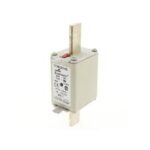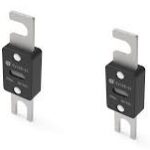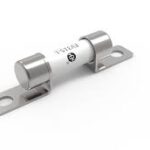Fuses > Electric Vehicle Fuses
Sinofuse EV Fuses
Quick Overview
Experience reliable and efficient circuit protection of your electric vehicles with Sinofuse Fuses. Engineered to endure high voltage levels, these fuses deliver superior protection for your electronics, ensuring a continuous power supply and peace of mind.

Details
EV & HEV Fuses by Sinofuse Circuit Protection:
Sinofuse’s Electric Vehicle (EV) and Hybrid Electric Vehicle (HEV) fuses are designed specifically for overload and short circuit protection in EV and HEV applications. These fuses cater to 240V, 500V, and 1000V systems, making them ideal for use in main battery packs, battery modules, junction boxes, auxiliary circuits, and charging stations.
Key Features:
- Higher Voltage Rating: Enhances system efficiency by enabling the use of smaller, more cost-effective conductors, suitable for higher voltage battery packs.
- High Interrupting Rating: Protects high-capacity battery packs essential for vehicle acceleration and range.
- Fast Response: Opens up to ten times faster under high fault current conditions, ensuring reliable protection of circuits and components.
- Space and Weight Efficiency: Occupies up to 48% less space compared to conventional high-speed fuses, aiding in space and weight reduction.
- Data Logging System: Each fuse is marked with a serial number and date code for traceability of critical quality characteristics.
- Simulated Driving Profiles: Unique driving conditions can be simulated to verify proper fuse sizing and performance under various driving behaviors.
- Overload Operation: Functions as low as 200% overload, offering backup protection to the battery management system.
Sinofuse boasts comprehensive production lines for NH type, fast-acting, high-speed, PV type, UL cylindrical, and IEC fuses, along with holders and blocks, with a total production capacity of up to 1 million fuses per month.
Eco-friendly electric vehicles (EVs, HEVs, and PHVs) have rapidly gained market share as social awareness of environmental protection has grown over the years. EVs, which are equipped with high-voltage batteries, require safeguards against electrification and secondary disasters in the event of traffic accidents or malfunctions. Sinofuse provides a solution by enabling the safe and instantaneous shutdown of high-voltage electric currents.
Sinofuse is not only applicable to EVs but can also be used in any industrial application requiring instant circuit isolation.
Sinofuse is a fuse designed to safely and instantaneously shut down high-voltage electrical currents. When a signal is detected from the vehicle, an ignition current is generated to activate the Sinofuse Fuse, which shuts down the circuit and prevents electrical flow.
This instant electrical shutdown is achieved through the high reliability developed in the inflator field. The Sinofuse Fuse is suitable not only for electric vehicles but also for gasoline vehicles.
The safe, millisecond-level electrical shutdown capability of Sinofuse can also be utilized in systems for industrial power storage, heavy-duty batteries, renewable energy storage, and electricity transmission.
About Sinofuse:
Sinofuse specializes in the R&D, production, and supply of circuit protection components, fuses, and auxiliaries for a wide range of industries, including EVs, renewables, BESS, rail, telecom, and more. Headquartered in Xi’an High-Tech Development Zone, Sinofuse is a member of the LV Electric Appliances Committee and National Standards Commission of Fuses, and complies with ISO 9000, 14000, and OHSAS 18000 standards.
Sinofuse Exclusive Deal with a German Vehicle manufacturer:
In an exclusive agreement, Sinofuse has been designated as the supplier of two types of electrical parts, suitable for high voltage (1,000 volts DC) and low voltage (70 VDC), for a new line of electric vehicles from a German manufacturer. The mass production of this new EV model is set to begin in May 2025. While this deal will not significantly impact Sinofuse’s financial results this year, due to a confidentiality agreement, the client’s name cannot be disclosed.
Click here to Download Datasheet
-

506-1-T1Z-125A690V Sinofuse Square Fuse 125A 690V tubular Blade Screw
Read more -

506-1-T1Z-160A690V Sinofuse Square Fuse 160A 690V tubular Blade Screw
Read more -

Chip fuse DC70V 150A Chip Tube Fuse
Read more -

Chip fuse DC70V 175A Chip Tube Fuse
Read more -

Chip fuse DC70V 200A Chip Tube Fuse
Read more -

Chip fuse DC70V 400A Chip Tube Fuse
Read more -

Chip fuse DC70V 450A Chip Tube Fuse
Read more -

Chip fuse DC70V 500A Chip Tube Fuse
Read more -

EV323-2EL Sinofuse Fuse
Read more -

EV323-3NL Sinofuse Fuse
Read more -

EV323-3NM Sinofuse Fuse
Read more -

EV325-3EC Sinofuse Fuse
Read more